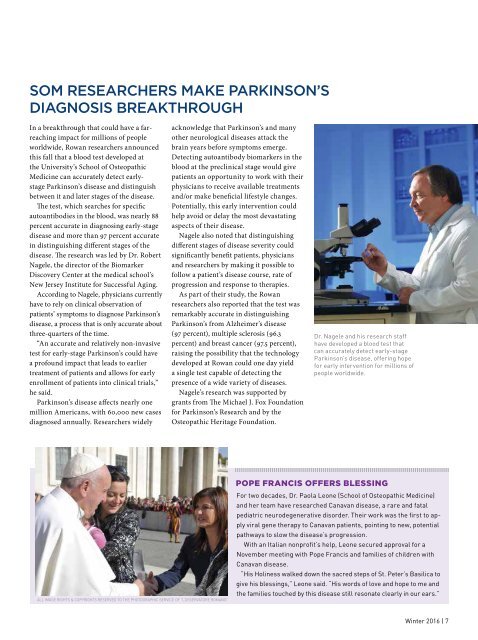save the date
rowan_mag_winter_2016
rowan_mag_winter_2016
Create successful ePaper yourself
Turn your PDF publications into a flip-book with our unique Google optimized e-Paper software.
SOM RESEARCHERS MAKE PARKINSON’S<br />
DIAGNOSIS BREAKTHROUGH<br />
In a breakthrough that could have a farreaching<br />
impact for millions of people<br />
worldwide, Rowan researchers announced<br />
this fall that a blood test developed at<br />
<strong>the</strong> University’s School of Osteopathic<br />
Medicine can accurately detect earlystage<br />
Parkinson’s disease and distinguish<br />
between it and later stages of <strong>the</strong> disease.<br />
The test, which searches for specific<br />
autoantibodies in <strong>the</strong> blood, was nearly 88<br />
percent accurate in diagnosing early-stage<br />
disease and more than 97 percent accurate<br />
in distinguishing different stages of <strong>the</strong><br />
disease. The research was led by Dr. Robert<br />
Nagele, <strong>the</strong> director of <strong>the</strong> Biomarker<br />
Discovery Center at <strong>the</strong> medical school’s<br />
New Jersey Institute for Successful Aging.<br />
According to Nagele, physicians currently<br />
have to rely on clinical observation of<br />
patients’ symptoms to diagnose Parkinson’s<br />
disease, a process that is only accurate about<br />
three-quarters of <strong>the</strong> time.<br />
“An accurate and relatively non-invasive<br />
test for early-stage Parkinson’s could have<br />
a profound impact that leads to earlier<br />
treatment of patients and allows for early<br />
enrollment of patients into clinical trials,”<br />
he said.<br />
Parkinson’s disease affects nearly one<br />
million Americans, with 60,000 new cases<br />
diagnosed annually. Researchers widely<br />
acknowledge that Parkinson’s and many<br />
o<strong>the</strong>r neurological diseases attack <strong>the</strong><br />
brain years before symptoms emerge.<br />
Detecting autoantibody biomarkers in <strong>the</strong><br />
blood at <strong>the</strong> preclinical stage would give<br />
patients an opportunity to work with <strong>the</strong>ir<br />
physicians to receive available treatments<br />
and/or make beneficial lifestyle changes.<br />
Potentially, this early intervention could<br />
help avoid or delay <strong>the</strong> most devastating<br />
aspects of <strong>the</strong>ir disease.<br />
Nagele also noted that distinguishing<br />
different stages of disease severity could<br />
significantly benefit patients, physicians<br />
and researchers by making it possible to<br />
follow a patient’s disease course, rate of<br />
progression and response to <strong>the</strong>rapies.<br />
As part of <strong>the</strong>ir study, <strong>the</strong> Rowan<br />
researchers also reported that <strong>the</strong> test was<br />
remarkably accurate in distinguishing<br />
Parkinson’s from Alzheimer’s disease<br />
(97 percent), multiple sclerosis (96.3<br />
percent) and breast cancer (97.5 percent),<br />
raising <strong>the</strong> possibility that <strong>the</strong> technology<br />
developed at Rowan could one day yield<br />
a single test capable of detecting <strong>the</strong><br />
presence of a wide variety of diseases.<br />
Nagele’s research was supported by<br />
grants from The Michael J. Fox Foundation<br />
for Parkinson’s Research and by <strong>the</strong><br />
Osteopathic Heritage Foundation.<br />
Dr. Nagele and his research staff<br />
have developed a blood test that<br />
can accurately detect early-stage<br />
Parkinson’s disease, offering hope<br />
for early intervention for millions of<br />
people worldwide.<br />
POPE FRANCIS OFFERS BLESSING<br />
ALL IMAGE RIGHTS & COPYRIGHTS RESERVED TO THE PHOTOGRAPHIC SERVICE OF “L’OSSERVATORE ROMANO”<br />
For two decades, Dr. Paola Leone (School of Osteopathic Medicine)<br />
and her team have researched Canavan disease, a rare and fatal<br />
pediatric neurodegenerative disorder. Their work was <strong>the</strong> first to apply<br />
viral gene <strong>the</strong>rapy to Canavan patients, pointing to new, potential<br />
pathways to slow <strong>the</strong> disease’s progression.<br />
With an Italian nonprofit’s help, Leone secured approval for a<br />
November meeting with Pope Francis and families of children with<br />
Canavan disease.<br />
“His Holiness walked down <strong>the</strong> sacred steps of St. Peter’s Basilica to<br />
give his blessings,” Leone said. “His words of love and hope to me and<br />
<strong>the</strong> families touched by this disease still resonate clearly in our ears.”<br />
Winter 2016 | 7


